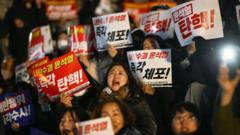South Korea's political landscape is in turmoil as President Yoon Suk Yeol is under intense scrutiny and pressure to resign following his controversially declared martial law, which was quickly retracted amid public backlash. Citizens in Seoul have staged demonstrations for two consecutive days demanding his resignation, with indications that these protests will continue to grow in scale.
The push for impeachment is spearheaded by the opposition, aiming for a parliamentary vote on Saturday. For Yoon's impeachment to pass, discontent within his own party is crucial, as it would require at least eight members from his party to support the motion for a two-thirds majority in the National Assembly. Yoon, already facing a plethora of challenges including diminishing approval ratings and corruption allegations, stunned the nation with a martial law declaration, citing threats from perceived "anti-state forces” and North Korea.
However, the declaration quickly backfired, leading to a rapid reversal as parliament rejected his move. Lawmakers had to physically circumvent barriers to ensure a swift vote against the emergency declaration. Since retracting his dramatic step early Wednesday, Yoon has remained silent amidst escalating tensions.
Protests have continued to swell, with larger gatherings anticipated as citizens mobilize after work hours. Although there are small rallies supporting the president, they pale in comparison to the anti-Yoon sentiments rippling through the capital. Meanwhile, lawmakers are vigilantly monitoring any future attempts by Yoon to declare martial law again.
Adding to the scandal, Yoon's defense minister Kim Yong-hyun has resigned, taking responsibility for suggesting the martial law measures to the president, a move that has drawn immense criticism. Early reports indicate that many within Yoon's administration were unaware of his intentions, leading to significant confusion regarding the legality and purpose of the martial law declaration.
An impeachment motion was officially submitted late Wednesday, mandating a vote within 72 hours according to South Korean law. Should the motion be approved, Yoon would be suspended from office, with the prime minister stepping in as acting president until a Constitutional Court trial determines the fate of the impeachment—with a process that may last up to 180 days. This evolving situation leaves South Korea's leadership and political stability hanging in the balance as Yoon's presidency faces a precarious future.
The push for impeachment is spearheaded by the opposition, aiming for a parliamentary vote on Saturday. For Yoon's impeachment to pass, discontent within his own party is crucial, as it would require at least eight members from his party to support the motion for a two-thirds majority in the National Assembly. Yoon, already facing a plethora of challenges including diminishing approval ratings and corruption allegations, stunned the nation with a martial law declaration, citing threats from perceived "anti-state forces” and North Korea.
However, the declaration quickly backfired, leading to a rapid reversal as parliament rejected his move. Lawmakers had to physically circumvent barriers to ensure a swift vote against the emergency declaration. Since retracting his dramatic step early Wednesday, Yoon has remained silent amidst escalating tensions.
Protests have continued to swell, with larger gatherings anticipated as citizens mobilize after work hours. Although there are small rallies supporting the president, they pale in comparison to the anti-Yoon sentiments rippling through the capital. Meanwhile, lawmakers are vigilantly monitoring any future attempts by Yoon to declare martial law again.
Adding to the scandal, Yoon's defense minister Kim Yong-hyun has resigned, taking responsibility for suggesting the martial law measures to the president, a move that has drawn immense criticism. Early reports indicate that many within Yoon's administration were unaware of his intentions, leading to significant confusion regarding the legality and purpose of the martial law declaration.
An impeachment motion was officially submitted late Wednesday, mandating a vote within 72 hours according to South Korean law. Should the motion be approved, Yoon would be suspended from office, with the prime minister stepping in as acting president until a Constitutional Court trial determines the fate of the impeachment—with a process that may last up to 180 days. This evolving situation leaves South Korea's leadership and political stability hanging in the balance as Yoon's presidency faces a precarious future.



















